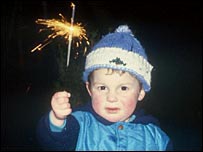-
(单词翻译:双击或拖选)
That rhyme is repeated by children in Britain to remember why, every year on 5th November, many British people celebrate Bonfire Night.
They might celebrate at home in their gardens, by building a bonfire and letting off fireworks. Young children like to light sparklers and wave them.
There are also many organised firework displays in public areas – a huge bonfire is built and there will usually be a long firework display with big, colourful fireworks like bangers, rockets, and Catherine wheels.
This festival falls in Autumn when the weather is quite cold, so people watch the fireworks and eat hot food to keep them warm – hot dogs or jacket potatoes for example and you might drink mulled wine or hot chocolate.
So why do British people do this? Well, on November 5th, 1605, a man called Guy Fawkes tried to blow up the British Houses of Parliament with gunpowder.
He wanted to get revenge on the King at that time for his lack of tolerance2 towards Catholics. However, the plot was discovered and Guy Fawkes was caught and executed for treason.
It was then that the tradition of Bonfire Night began. People started to have bonfires to celebrate the safety of the King because he wasn’t blown up. November 5th is also known as Guy Fawkes’ Night.
People would burn effigies3 of Guy Fawkes and even today, people make dummies4 of Guy Fawkes to burn, which are called ‘the Guy’. Children still wheel their dummies through the streets, knocking on people’s doors and asking for ‘a penny for the Guy’ to earn some money.
The origins of the festival have much less importance today but it remains5 a fun and exciting night for children and adults alike. But if you’re lighting6 fireworks, then be careful!
|
GLOSSARY 词汇表 |
|
|
gunpowder bonfire sparklers hot dogs mulled wine Houses of Parliament lack of Catholics executed dummies |
treason letting off firework display jacket potatoes blow up to get revenge on tolerance plot effigies to wheel |
 收听单词发音
收听单词发音
1
gunpowder

|
|
| n.火药 | |
参考例句: |
|
|
|
2
tolerance

|
|
| n.宽容;容忍,忍受;耐药力;公差 | |
参考例句: |
|
|
|
3
effigies

|
|
| n.(人的)雕像,模拟像,肖像( effigy的名词复数 ) | |
参考例句: |
|
|
|
4
dummies

|
|
| n.仿制品( dummy的名词复数 );橡皮奶头;笨蛋;假传球 | |
参考例句: |
|
|
|
5
remains

|
|
| n.剩余物,残留物;遗体,遗迹 | |
参考例句: |
|
|
|
6
lighting

|
|
| n.照明,光线的明暗,舞台灯光 | |
参考例句: |
|
|
|


















